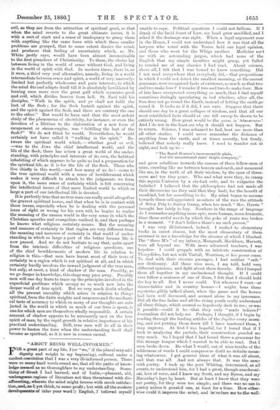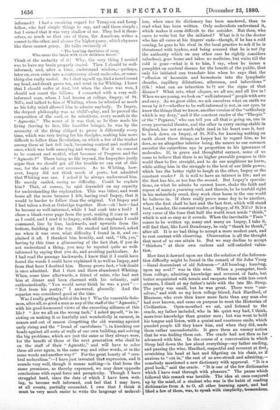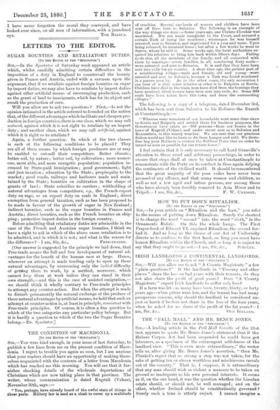"ABOUT BEING WELL-INFORMED."
FOR a great part of my life, I (or "we," if the plural may add dignity and weight to ray beginning), suffered under a modest conviction that I was a very ill-informed person. There were so many hard words round me, that all the paths of know- ledge seemed as no thoroughfare to my understanding. Some- thing of Greek I had learned, and of Latin,—pleasant, old, umbrageous regions of literature not then threatened with dis- afforesting, wherein the mind might browse with much satisfac- tion, and, as I yet think, to some profit; but with all the modern developments of (alas poor word !) English, I believed myself
unable to cope. Political questions I could not fathom. If I drank of the lucid fount of Law, my head grew muddled, and I asked if the drainage was right. When a legal argument rose in the House, I could not understand how it was that all the lawyers who voted with the Tories held one legal opinion, and those who went for the Whigs another. Medicine met me with an astounding jargon, which had none of the English that my simple faculties might grasp, yet failed to remind me of any classics I had read. About science, above all, I felt that I was bound to know something. Did I not read everywhere that everybody did,—that propositions in which I could not detect the smallest meaning, or the merest grammar, were recognised facts of existence, as much as that two and two make four P I wonder if two and two do make four. Men of late have overproved everything so much, that I find myself sometimes daringly speculating in bed whether, after all, the Sun does not go round the Earth, instead of letting the earth ga round it. It looks as if it did, I am sure. Suppose that there should one day be a great collapse of wisdom, and that all our most established facts should at one fell swoop be shown to be entirely wrong. How great would be the yOs' is'AOXY0470100 And I do not in the least see why it should not happen. But to return. Science, I was ashamed to feel, beat me more than all other studies. I could never remember the distance of anything from the earth, and at times secretly, but firmly, believed that nobody really know. I used to wander out at night, and look up to-
" The Royal Heaven's immeasurable plain,
And the unnumbered stars' bright company,"
and grow rebellious towards the canons of those fellow-men of mine, crawling like me between heaven and earth, and measured like me, in the teeth of all their wisdom, by the span of three- score and ten tiny years. Who and what were they, to cramp this mystic Universe by a six-foot rule, and to vulgarise the Infinite ? I believed that the philosophers had not made all their discoveries (as they said that they had), for the benefit of mankind, but for something to do. My mind began to assume towards these self-appointed monitors of the race the attitude of Betsy Prig to Sairey Clamp, when too much "Mrs. Harris" brought her fairly to bay. Nowhere in the range of language do I remember anything more epic, more human, more dramatic, than those awful words by which the yoke of years was broken in a moment. "I don't believe there's no such person."
I was very ill-informed, indeed. I rushed to elementary books in secret shame, but the most elementary of them assumed in me a knowledge for the absence of which I blushed. The "three M's" of my infancy, Mangnall, Markham, Maned, were all beyond me. With more advanced teachers, I was hopeless. I could grapple with an intricate construction of Thucydides, but not with Tinfoil, Worrisou, et hoc genus mac To deal with their obscure passages, I had neither " crib " nor dictionary. All these wise men, I am told, hold very different opinions, and fight about them fiercely. But I lumped them all together in my unchastened thought. If I could ever follow a sentence of one of them, I felt that I should hold the key to all. But I never could. Yet wherever I went—at dinner-tables and in country houses—I might hear these mysteries glibly talked about, when the game and the horses had been well discussed, and seemed alone in my ignorance. Did all the fine ladies and all the rising youth really understand all these things, which seemed so hopelessly dark to me ; or was it possible—could it be—that they only "made believe ?" Journalism did not help me. Perhaps, I thought, if I begin by reading through the leading articles of the Jupiter every morn- ing, and not putting them down till I have mastered them, I may improve. At first I was hopeful, for I found that if I took to analysing the periods, their construction puzzled me very much. So I hoped that I had found there a grammar for this strange tongue which I wanted to be able to read. But I soon broke down. Do what I would, ont.of nine-tenths of the wilderness of words I could compress or distil no definite mean- ing whatsoever. I got general ideas of what it was all about, and that was alt. And not always that. It was the same with poetry. I took up the poet Whiting, determined, at all events, to understand him, for I had a great, though anachroni- eal, love of verse, and I knew my Scott, and may Byron, awl my Macaulay's lays by heart. But at least I knew that they were not poetry, for they were too simple; and there was no use in poetry unless it puzzled one, at least for a time. How other- . wise could it improve the mind, and inL.roduce ate to the well-
informed ? I had a sneaking regard for Tennyson and Long- fellow, who had simple things to say, and said them simply ; but I owned that it was very shallow of me. They feel it them- selves, so much so that one of them, the American, writes a sonnet to the other, and abuses the higher poesy, which rhymers like these cannot grasp. He talks enviously of
The howling dervishes of song,
Who craze the brain with their delirious dance."
Think of the audacity of it! Why, the very thing I needed was to have my brain properly crazed. Then I should be well- informed, and, after a time, understand wisdom,—perhaps, later on, even enter into a controversy about molecules, or some- thing else really useful. So I shut myself up, tied a towel round my head, and drank green tea, and went in for Whiting. 1 knew that I should suffer at first, but when the shore was won, I should not count the billows. I consorted with a very well- informed man, whom I had known at college, Impey, of St. Nil's, and talked to him of Whiting, whom he admired as much as his lofty mind allowed him to admire anybody. To Impey, the deepest philosophy was as child's-play, and he proved the composition of the soul, or its substitute, every month in the "Agnostic." The worst of it was that, as he thus made his living (having to live, like humbler beings), he was by the necessity of the thing obliged to prove it differently every time, which was very trying for his disciples, making him more difficult to follow than Revelation, on which a few of the weaker among them at last fell back, becoming content and restful at once, which was both annoying and wrong. For if we consent to be content and restful, what becomes of Progress and the "Agnostic P" There being no life beyond, the Irnpeyites justly argue that we should get all the trouble we can out of this one, for the sake of our successors. As to Whiting, how- ever, Impey did not think much of poets, but admitted that Whiting was one. I asked if he always understood him. He merely smiled, seeing no difficulty. Could he explain him ? That, of course, he said depended on my capacity for understanding the explanation. This was bitter, and went home all the more because I felt, having read Impey, that it would be harder to follow than the original. Yet Impey and I had taken a first at Oxbridge together. How—oh ! how—had he become so well-informed, while I had sunk into a fool ? I chose a blank-verse page from the poet, making it scan as well as I could, and I read it to Impey, with all the emphasis I could command, line by line, backwards, and upwards from the bottom, finishing at the top. He smoked and listened, asked me when it was over, what difficulty I found in it, and ex- plained it all. I thanked him humbly, and said, "Oh, yes," having by this time a glimmering of the fact that, if you do . not understand a thing, you may be reputed quite as well-
informed by saying that you do, and avoiding particulars. As I had read the passage backwards, I knew that if I could have found the words I could have explained it as well as Impey, and from that hour I doubted him. Heresy grows fast, v lien doubt 16 once admitted. But I then and there abandoned Whiting. When, some time afterwards, a friend of mine, who had met him at dinner and been charmed with his urbanity, said enthusiastically, "You would never think he was a poet" :— "Not from his poetry," I answered, gloomily. And the repartee was considered good at the time.
Was I really getting hold of the key? Was the venerable Solo- mon, after all, as good a man as any of the staff of the "Agnostic," with his good-humoured views of the exceeding silliness of this life ? "Are we all on the wrong tack," I asked myself, "in in- sisting on making it so fearfully and wonderfully in earnest, in season and out of season (forgetting the old warning against early rising and the "bread of carefulness "), in knocking our heads against all sorts of walls of our own building, and solving the big problems, which are just the same as they always were, for the benefit of those of the next generation who shall be on the staff of their "Agnostic," and will have to solve them all over again, in the same way and other words, or in the same words and another way?" For the great beauty of "cere- bral molecnlism "—I have just invented that expression, and it sounds very well, though it means nothing—is that from the same premisses, as thereby expressed, we may draw opposite conclusions with equal force and perspicuity. Though I have struggled hard, since the date of which I have been writ- ing, to become well informed, and feel that I may have, at all events, partially succeeded, I own that I think it must be very much easier to write the language of molecul-
ism, when once its dictionary has been mastered, than to read what has been written. Only molecnlists understand it, which makes it seem difficult to the outsider. But then, who cares to write but for the initiated? What is it to the doctor who has all cures at his fingers' ends—though, if he has a cold coming, he goes to his rival in the local practice to ask if he is threatened with typhus, and being assured that he is not (by the authority which on any other case he rightly considers valueless), goes home and takes no medicine, but waits till the cold is gone—what is it to him, I say, when he issues a pamphlet on cerebral disease for the benefit of the public, that only his initiated can translate him when he says that the "effusion of luematin and hmmatosin into the lymphatic sheaths, capillary dilatations, atheroma, and infarctions" (Oh ! what can an infarction be ?) are the signs of that disease? What sets, what cliques, we all are, and all live in ! When we are young, we look on" well-informed" people with awe and envy. As we grow older, we ask ourselves what on earth we mean by it ?—whether to be well-informed is not, in our eyes, to know the things that we know, another version of the "orthodoxy which is my doxy," and if the constant reader of the "Thespis" or the "Pegasus," who can tell you all that is going on, one in every provincial theatre, and the other in every racing-stable in England, has not as much right (and in his heart uses it, too) to look down on Impey, of St. Nil's, for knowing nothing on earth about these things, as Impey has to regard him, as he does, as an altogether inferior being, the nearer to our common ancestor the catarrhine ape in proportion to his ignorance of molecules. If, in grave and thoughtful earnest, some of us come to believe that there is no higher provable purpose in this world than to live straight, and to do our neighbour no harm, while aiding him in the struggle to the best of our little power, which has the better right to laugh at the other, Impey or the constant reader ? It is well to have an interest in life ; and as the first has his, so too has the second. But Impey's specula- tions, on what he admits he cannot know, shake the faith and repose of many a yearning soul, and therein, be he tenfold right in his melancholy creed, they work clear harm in the one world he believes in. If there really prove some day to be another, where the first shall be last and the last first, which will stand best, I wonder, the constant reader, or Impey, of St. Nil's? It is a very curse of the time that half the world must needs "think," which is not so easy as it sounds. When the inevitable " Finis " comes to be written up, many and many an Impey, I take it, will find that, like Lord Dundreary, he only "thank he thank," after all. It is no bad thing to accept a more modest part, and to rest content with observing. Observation is all the thought that most of us can attain to. But we may decline to accept " thinkers " at their own curious and self-satisfied valua- tion.
How first it dawned upon me that the solution of the Informa- tion difficulty might be found in the remark of Sir John Vesey —lineal descendant of old Solomon—" All humbug; humbug, upon my soul!" was in this wise. When a youngster, fresh from college, admiring knowledge and reverent of facts, but better acquainted with tennis and racquets than with less exact sciences, I dined at my father's table with the late Mr. Strap. The party was small, but he was great. There were "our- selves," and with us my keen college friend, Jack Hardhed, of Bluenose, who even then knew more facts than any man else had ever known, and came on purpose to meet the Historian of Civilisation. Open-mouthed we sat, and listened to the oracle, my father included, who in his quiet way had, I think, more true knowledge than greater men; but was wont to hold his tongue and listen, with a quaint and courteous smile, which puzzled people till they knew -him, and when they did, made them rather uncomfortable. It gave them an uneasy notion that he was finding them out. The oracle had not then so far advanced with him. In the course of a conversation in which Strap laid down the law about everything—my father smiling, and passing the wine, Hardhed, respectful and reverent at first, scratching his head at last and fidgeting on his chair, as if anxious to "cut in," the rest of IlB awe-struck and admiring,— somebody mentioned a new dictionary with approval. "it is a good book," said the oracle. "It is one of the few dictionaries which I have read through with pleasure." The pause which followed this remark was terrible. The idea at once conjured up by the mind, of a student who was in the habit of reading dictionaries from A to 0, all other learning apart, and had liked a few of them, was, to speak with simplicity, tremendous.
I have never forgotten the moral they conveyed, and have looked ever since, on all men cf information, with a jaundiced .eye.
Tom BALM'S.




































 Previous page
Previous page